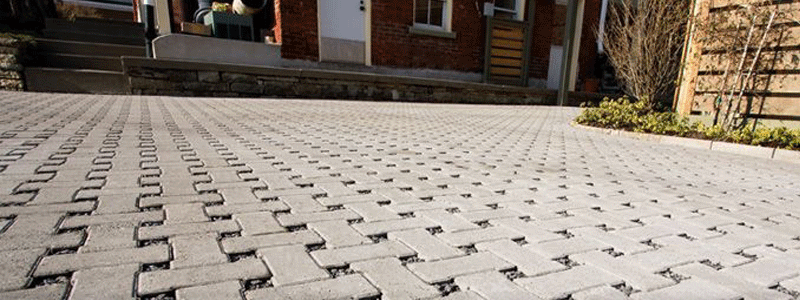Table of Contents
Permeable-paver driveways have grown in popularity through recent years due to their eco-friendly materials and sleek aesthetics. Many home and business owners are unfamiliar with the installation process for these types of driveways. If you have been considering a new paver driveway for your home or business, the installation process may be a bit more complicated than a traditional concrete driveway. This is why it's always recommended to contact a team of professionals to assist with the entire process.
Keep reading below to learn more about the installation process of a permeable-paver driveway.
Permeable Pavers
You must first understand that these types of driveways are made from previous materials rather than traditional concrete pavers. These pavers allow water to pass through and dry on top of the surface, which helps prevent runoff and water build-up. However, these materials are typically very heavy and must be adequately supported to prevent them from sinking into the surface. This is where a concrete bed comes into play alongside your permeable paver driveway.
Installation Process Steps
The majority of this process is entirely reliant on your location and the permeability of your area. If you have a steep grade, there are more steps in the installation process to consider.
In most cases, a site visit from a local paving contractor is recommended in order to determine your exact needs for your new paver driveway. The team will give you a hand in determining the best shape and design for your driveway and advise you on the installation process.
The following is a general list of steps for a permeable-paver installation:
1) Soil Testing and Excavating
The installation process begins with a soil test. This is done to ensure your area has the right permeability for pavers and that there are no hidden underground utilities in the way of your driveway. If an extensive excavation is needed, then some areas may not be prime for a paver installation. There are certain requirements your land must meet, but the experts will determine if this is suitable for your location.
2) Preparing the Base
Once the area has been excavated, and all utilities have been located, a base must be prepared to support your pavers. A forming system is typically used to secure the paver bed in place, so it does not sink or move. If you are building your driveway on a steep hill, again, the process will be slightly different to meet safety standards. Many contractors choose to prepare the base with stone layers to ensure a strong and stable surface.
3) Preparing the Surface
The final step in preparing for your permeable paver installation is adding the finishing touches to the surface of your property. Depending on the size of your area, additional fill dirt may be needed. However, you will also need to grade the surrounding area. This is done with a wheel grader to ensure your gravel base does not overflow onto your lawn or other landscape features. You may also need to consider installing edging for your driveway to help keep the pavers from moving.
4) Install the Pavers
The final step is to install the pavers into your desired shape and design. Your contractors will begin by marking out the layout of your driveway, and then they will dig a small trench around your property where the edges of each paver will sit. Once all prep work has been completed, it's time to add sand in between the pavers and finalize the installation. Contractors typically start the installation from one corner of the driveway and work their way to the opposite side. You can also choose to install stepping stones or another type of decorative brick in between the pavers for a unique look. This is all up to you and what you envision for your new permeable-pavers driveway.
5) Finishing Touches
One of the final steps in your permeable-paver installation is to add a small amount of sand. This helps fill in any gaps between each paver and adds a smooth, finished appearance to your new driveway. It's also common for contractors to use a plate compactor to touch up the gravel base. Stepstones, patio furniture, and other finishing touches can be added at this point as well. Your contractors will work with you to ensure your driveway is exactly what you want for your home.
The final result of your paver driveway will provide a more attractive, durable surface for moving vehicles and other activities. A new permeable-paver driveway features an improved water drainage system while providing looks that can't be obtained with traditional concrete pavers. If you are ready to start your driveway transformation, reach out to Houston Driveway Replacement for a consultation.

